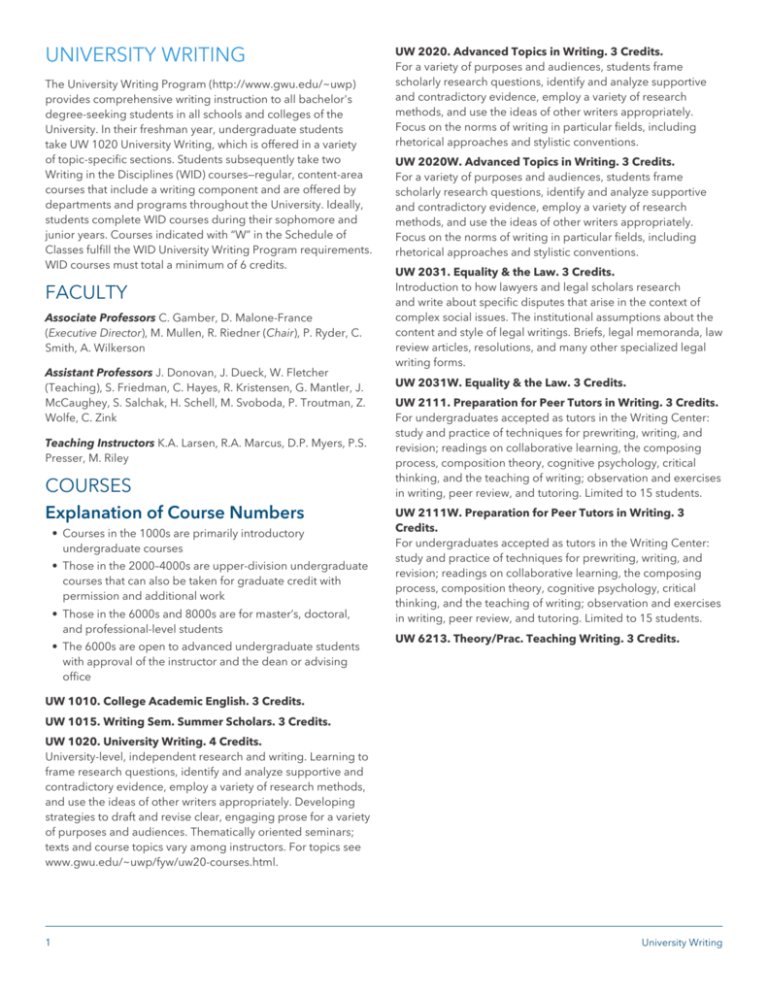The George Washington University 2015
advertisement

UNIVERSITY WRITING The University Writing Program (http://www.gwu.edu/~uwp) provides comprehensive writing instruction to all bachelor's degree-seeking students in all schools and colleges of the University. In their freshman year, undergraduate students take UW 1020 University Writing, which is offered in a variety of topic-specific sections. Students subsequently take two Writing in the Disciplines (WID) courses—regular, content-area courses that include a writing component and are offered by departments and programs throughout the University. Ideally, students complete WID courses during their sophomore and junior years. Courses indicated with “W” in the Schedule of Classes fulfill the WID University Writing Program requirements. WID courses must total a minimum of 6 credits. FACULTY Associate Professors C. Gamber, D. Malone-France (Executive Director), M. Mullen, R. Riedner (Chair), P. Ryder, C. Smith, A. Wilkerson Assistant Professors J. Donovan, J. Dueck, W. Fletcher (Teaching), S. Friedman, C. Hayes, R. Kristensen, G. Mantler, J. McCaughey, S. Salchak, H. Schell, M. Svoboda, P. Troutman, Z. Wolfe, C. Zink Teaching Instructors K.A. Larsen, R.A. Marcus, D.P. Myers, P.S. Presser, M. Riley COURSES Explanation of Course Numbers • Courses in the 1000s are primarily introductory undergraduate courses • Those in the 2000–4000s are upper-division undergraduate courses that can also be taken for graduate credit with permission and additional work • Those in the 6000s and 8000s are for master’s, doctoral, and professional-level students • The 6000s are open to advanced undergraduate students with approval of the instructor and the dean or advising office UW 2020. Advanced Topics in Writing. 3 Credits. For a variety of purposes and audiences, students frame scholarly research questions, identify and analyze supportive and contradictory evidence, employ a variety of research methods, and use the ideas of other writers appropriately. Focus on the norms of writing in particular fields, including rhetorical approaches and stylistic conventions. UW 2020W. Advanced Topics in Writing. 3 Credits. For a variety of purposes and audiences, students frame scholarly research questions, identify and analyze supportive and contradictory evidence, employ a variety of research methods, and use the ideas of other writers appropriately. Focus on the norms of writing in particular fields, including rhetorical approaches and stylistic conventions. UW 2031. Equality & the Law. 3 Credits. Introduction to how lawyers and legal scholars research and write about specific disputes that arise in the context of complex social issues. The institutional assumptions about the content and style of legal writings. Briefs, legal memoranda, law review articles, resolutions, and many other specialized legal writing forms. UW 2031W. Equality & the Law. 3 Credits. UW 2111. Preparation for Peer Tutors in Writing. 3 Credits. For undergraduates accepted as tutors in the Writing Center: study and practice of techniques for prewriting, writing, and revision; readings on collaborative learning, the composing process, composition theory, cognitive psychology, critical thinking, and the teaching of writing; observation and exercises in writing, peer review, and tutoring. Limited to 15 students. UW 2111W. Preparation for Peer Tutors in Writing. 3 Credits. For undergraduates accepted as tutors in the Writing Center: study and practice of techniques for prewriting, writing, and revision; readings on collaborative learning, the composing process, composition theory, cognitive psychology, critical thinking, and the teaching of writing; observation and exercises in writing, peer review, and tutoring. Limited to 15 students. UW 6213. Theory/Prac. Teaching Writing. 3 Credits. UW 1010. College Academic English. 3 Credits. UW 1015. Writing Sem. Summer Scholars. 3 Credits. UW 1020. University Writing. 4 Credits. University-level, independent research and writing. Learning to frame research questions, identify and analyze supportive and contradictory evidence, employ a variety of research methods, and use the ideas of other writers appropriately. Developing strategies to draft and revise clear, engaging prose for a variety of purposes and audiences. Thematically oriented seminars; texts and course topics vary among instructors. For topics see www.gwu.edu/~uwp/fyw/uw20-courses.html. 1 University Writing






